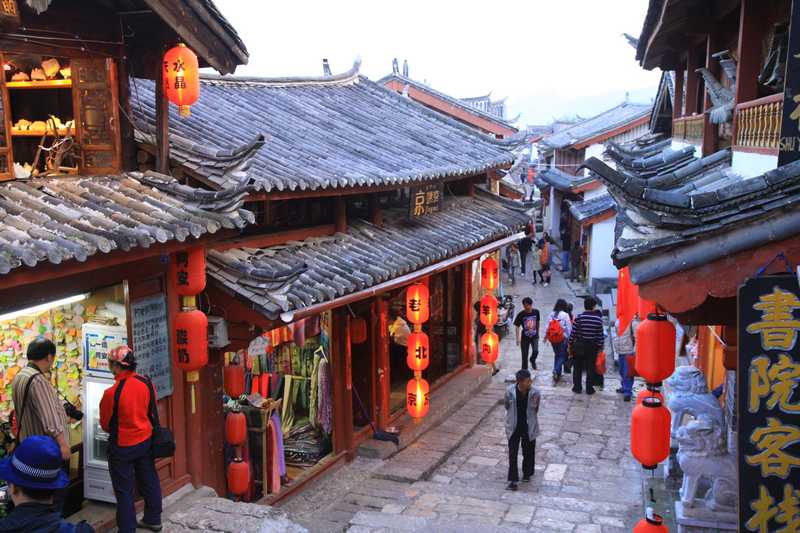Hands waving and pointing in the picture book gives us little more than that we should follow the man on the motorbike who will show us a place to camp which is near the ferry, or so we understand it. We struggle to maintain pace with him as we pass cows pulling heavy trailers of corn stalks, ladies tending their herds, paddies laden with ready to be harvested rice and school kids yelling the all to familiar "Hello" which, along with "bye bye" are the only English words any countrysiders speaks in China. The road turns to a dirt track then road again as we take numerous short cuts, where are we going? All will work out I tell myself. We pull down a small lane and pass under a persimmon tree, I notice a small sign saying Guesthouse in English. We are shown a simple but beautiful room with a balcony looking out over the famous Tiger Leaping Gorge in the distance, incredible! Before we know it tea is poured and fresh, juicy pomegranates are placed in front of us. Available everywhere, this unusual fruit has quickly become a favourite snack here. We ask the price and are told 1 and 5, ok, 150 then? The man draws with one finger on his open palm, 15 yuan each, just US $2 or so. The previous night we spent 200 yuan for an incredibly noisy room in the crowded tourist city of Lijang.The advice we had been given on the roads was great but did not take into account the magnitude and frequency of the hills along the way. With limited time, we again flagged down a passing pickup and caught the last rays of sun hitting the fields through the dusty windows the
ever of the vehicle as it raced towards Ninglang. One less than happy, but not dead pig and several close calls with dogs later, we were again on two wheels in total darkness at an intersection somewhere. Speculating as always, we tried to predict where we'd be in an hour as we rolled through dark streets past card playing shop keepers and
barking dogs. Our speculation, for once, was correct as we tucked up into bed after another unknown but delicious meal. The landscape became lush and green as water cascaded down mountains sides to huge, brown rivers in the valleys below. Teeth rattling as we descended again on cobbled roads made it seem possible that we'd reach
our destination, but that was only a dream. As the light faded and the barking dogs didn't, we searched for a place to camp, cliffs and drops left little flat land for anything, only that which had been manipulated into terraced rice paddies, but these were far and and cultivated. At last a rocky outcrop appeared close to the road, we gingerly sett up camp trying not to put too many holes in anything on the endless sharp rocks. A man and his goats observed and left us in peace. Lijang hit us in the face with hundreds of thousands of camera happy tourists wandering the picturesque streets of this ancient city amongst unhappy looking locals who appear less than pleased with having to dress up in traditional costumes each day to create a Disneyland like atmosphere where everything is exactly how it 'should' be. For sure a beautiful place, it's hard to, in the famous words of the Lonely Planet, 'soak up the atmosphere' of this place when meter long camera lenses (mine included) clutter each scene and crowds gather in such volumes that you must pick your way through, careful not to stand on any toes. As with any such place, head one street east or west from the main drag and you find a quiet empty street to
yourself, but this is short respite from the madness. Pedaling north out of there offered quick relief until we reached the toll gate where we were obliged to pay not only a fee for passing through 'a natural area' but, would you believe and 8 euros just for visiting Lijang! Now we know that it is Disneyland. In China nature is canned and sold as a consumer product. It is not possible to experience it first without paying someone something. This creates an expectation of perfection, natural wonders are even modified to make them 'more beautiful'. Visitors centers in the natural areas are packed with bus loads of domestic tourists all vying to have their photos taken next to the man made rocks and water
features while the real nature is left more or less unnoticed. Walkways, viewing platforms and obtrusive signs naming individual features all make for the perfect picture while creating a tangible gap between what really is nature and the people. Luckily there are hundreds of authentic villages and beautiful forests and mountains to make up for the Chinese way of seeing nature which differs so greatly from my own. As the road descends towards. The Tiger Leaping Gorge we are treated to unforgettable views with
incredible interactions between sunlight, clouds and a multi coloured landscape, real nature.
Support a great cause: DONATE NOW to The Cambodia Trust



























































